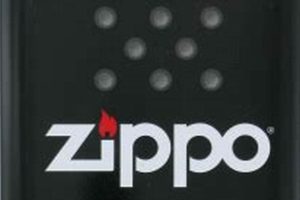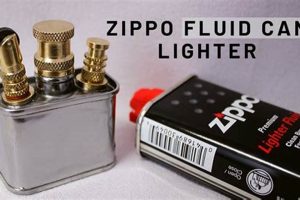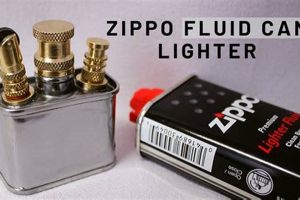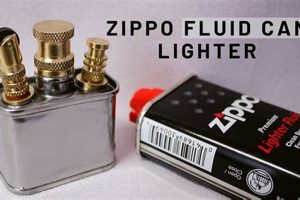Using charcoal lighter fluid in a Zippo-style lighter is strongly discouraged. Zippo lighters are designed for a specific type of refined petroleum distillate fuel. Charcoal lighter fluid, typically a mixture of hydrocarbons, often contains additives and heavier components not suitable for the narrow wick and delicate mechanism of these lighters. Attempting to use such a fluid can result in clogging, unreliable ignition, and potentially hazardous flare-ups.
The correct fuel ensures the longevity and proper function of the lighter. Using the manufacturer’s recommended fuel helps maintain a clean burn, prevents residue buildup, and avoids damage to the internal components. This practice ultimately contributes to the lighters reliability and extends its lifespan. Historically, Zippo-style lighters have earned a reputation for dependability, particularly in demanding conditions, a reputation built upon using the appropriate fuel.
This difference in fuels raises several important points for discussion: the specific properties of each fuel type, the potential risks associated with using improper fuels, proper lighter maintenance procedures, and safer alternatives for starting charcoal grills.
Tips for Proper Lighter Fuel Usage
Maintaining a lighter’s functionality and ensuring safe operation requires using the correct fuel. The following tips offer guidance on proper fuel selection and handling.
Tip 1: Consult the Manufacturer’s Recommendations: Always refer to the manufacturer’s instructions for the specific type of fuel recommended for the lighter. This information is crucial for optimal performance and safety.
Tip 2: Use Refined Petroleum Distillate: Opt for refined petroleum distillate specifically designed for lighters. This fuel type is formulated to burn cleanly and efficiently in these devices.
Tip 3: Avoid Substitutions: Never substitute lighter fluid with other flammable liquids, such as gasoline, kerosene, or charcoal lighter fluid. These substances can damage the lighter, create safety hazards, and produce undesirable fumes.
Tip 4: Store Fuel Safely: Store lighter fluid in a cool, dry place away from open flames, heat sources, and children. Proper storage prevents evaporation and reduces the risk of accidents.
Tip 5: Refill Carefully: When refilling a lighter, extinguish the flame completely and allow it to cool down. Refill slowly and avoid overfilling to prevent spills and leaks.
Tip 6: Clean Regularly: Periodically clean the lighter to remove any residue or debris that can affect its performance. Follow the manufacturer’s cleaning instructions for best results.
Tip 7: Dispose of Used Fuel Properly: Dispose of used lighter fluid and empty containers according to local regulations. Never pour lighter fluid down the drain.
Adhering to these guidelines ensures safe and efficient lighter operation, prolongs the lighter’s lifespan, and minimizes the risk of accidents.
By understanding the importance of using the correct fuel and following these safety precautions, users can enjoy the reliable performance and extended lifespan of their lighters.
1. Fuel Compatibility
Fuel compatibility is crucial when considering the use of any flammable liquid in a device designed for combustion. In the specific case of using grill lighter fluid in a Zippo lighter, compatibility is paramount for safe and effective operation. Using an incompatible fuel can lead to a variety of issues, from malfunction to potential hazards.
- Chemical Composition
Lighter fluids are typically refined petroleum distillates, formulated for clean burning and minimal residue. Grill lighter fluid, however, often contains different hydrocarbons, sometimes including additives to accelerate charcoal ignition. These variations in chemical composition can negatively interact with the delicate mechanisms of a Zippo lighter.
- Viscosity and Volatility
The viscosity and volatility of a fuel affect its flow rate and evaporation rate, impacting how effectively it saturates the wick and ignites. Lighter fluid is designed with specific viscosity and volatility for optimal performance in a Zippo. Grill lighter fluid may exhibit different properties, potentially causing issues such as flooding, inconsistent flames, or difficulty igniting.
- Residue and Clogging
The combustion process can produce residue, impacting a lighter’s long-term performance. Lighter fluid is formulated to minimize residue buildup. Grill lighter fluid, due to its different composition, can leave behind more residue, potentially clogging the wick and other internal components, leading to malfunctions and reduced lifespan.
- Flammability and Safety
Using an incompatible fuel can alter the flammability characteristics, posing safety risks. Grill lighter fluid may burn with a different intensity or temperature than lighter fluid, potentially causing damage to the lighter or even leading to uncontrolled flames. This incompatibility poses a clear hazard and should be avoided.
The incompatibility of grill lighter fluid with Zippo lighters stems from the fundamental differences in their chemical compositions, physical properties, and intended purposes. Attempting to use grill lighter fluid in a Zippo lighter compromises functionality, longevity, and most importantly, safety. Using the correct fuel is essential for maintaining the lighters performance and preventing potential hazards.
2. Flammability Risks
Significant flammability risks arise when considering the use of grill lighter fluid in a Zippo-style lighter. These risks stem from the inherent properties of grill lighter fluid, the design of Zippo lighters, and the potential for unintended interactions between the two. Grill lighter fluid is formulated for igniting charcoal, typically involving larger volumes and slower burn rates compared to the refined fuels used in Zippo lighters. This difference in combustion characteristics presents several hazards.
The higher flash point of some grill lighter fluids can lead to delayed ignition, potentially resulting in unexpected flare-ups when the fluid finally ignites. Conversely, some grill lighter fluids may contain volatile components that evaporate rapidly, creating a higher concentration of flammable vapors around the lighter. This increased vapor concentration can lead to larger flames than anticipated, posing a risk of burns or igniting nearby materials. Furthermore, the chemical composition of grill lighter fluid can differ significantly from that of Zippo lighter fluid. Introducing an incompatible fluid into the lighter’s mechanism can disrupt the intended combustion process, leading to unpredictable burning behavior and potential malfunctions, increasing the risk of fire.
Consider a scenario where an individual attempts to refill a Zippo lighter with grill lighter fluid. Accidental spillage during refilling can create a pool of highly flammable liquid, easily ignited by the lighter’s spark. Another scenario involves the lighter’s internal mechanisms. If the incompatible fluid clogs the wick or other components, it can lead to uncontrolled fuel release and subsequent ignition. These examples illustrate the potential for serious accidents resulting from the misuse of grill lighter fluid in Zippo lighters. Understanding these flammability risks underscores the importance of using the correct fuel to ensure safe and proper operation.
3. Lighter Damage
Damage to a Zippo-style lighter is a likely consequence of using grill lighter fluid. These lighters are precisely engineered for a specific type of fuel, a refined petroleum distillate. Grill lighter fluid, formulated for saturating and igniting charcoal, possesses different chemical properties, including higher viscosity and often various additives. Introducing this incompatible fluid into a Zippo lighter can cause a range of detrimental effects.
The thicker consistency of grill lighter fluid can clog the intricate wicking system within the lighter, impeding fuel flow and hindering proper ignition. Additives present in grill lighter fluid can leave gummy residues, further obstructing fuel delivery and potentially damaging the delicate internal mechanisms. Over time, this residue buildup can lead to complete malfunction. Furthermore, the combustion of grill lighter fluid can produce different byproducts than the intended fuel, potentially corroding internal components and degrading the lighter’s casing. A real-world example includes a user attempting to fill their Zippo with grill fluid, experiencing immediate difficulty igniting the lighter, followed by a sputtering, smoky flame, eventually leading to complete failure. Another instance involves a lighter’s wick becoming completely clogged after repeated use of grill fluid, rendering the lighter unusable.
Understanding the potential for lighter damage resulting from the use of improper fuel is crucial for maintaining the lighter’s functionality and longevity. Attempting to use grill lighter fluid in a Zippo lighter not only compromises its performance but also voids any manufacturer warranties. Opting for the correct fuel ensures reliable operation and preserves the lighter’s intended lifespan. This knowledge empowers users to make informed decisions about fuel choices and avoid costly repairs or replacements.
4. Residue Buildup
Residue buildup is a significant consequence of using grill lighter fluid in a Zippo-style lighter. These lighters are designed for a specific type of refined fuel, and using an incompatible fluid like grill lighter fluid can lead to the accumulation of unwanted deposits within the lighter’s mechanism. This residue can negatively impact the lighter’s functionality and lifespan.
- Clogged Wicks
Grill lighter fluid often contains heavier hydrocarbons and additives not present in standard lighter fluid. These substances do not burn as cleanly and can leave behind a sticky residue that clogs the wick. A clogged wick restricts fuel flow, making it difficult or impossible to ignite the lighter. A real-world example would be a lighter that initially ignites but quickly dies out due to insufficient fuel reaching the flame.
- Malfunctioning Striker Wheel
Residue can also accumulate on the striker wheel, the component responsible for creating the spark that ignites the fuel. This buildup can interfere with the wheel’s ability to generate a consistent spark, leading to ignition failures. Imagine a user repeatedly flicking the striker wheel with no resulting flame, a common scenario with residue buildup.
- Obstructed Fuel Lines
The fuel lines within the lighter can become partially or completely blocked by residue, further restricting fuel flow. This blockage can manifest as a weak, sputtering flame or a complete inability to ignite the lighter. A user might observe uneven fuel levels or difficulty refilling the lighter due to obstructed fuel lines.
- Deteriorated Lighter Casing
Some grill lighter fluids contain chemicals that can react with the materials of the lighter’s casing, leading to corrosion or discoloration. This deterioration not only affects the lighter’s aesthetics but can also compromise its structural integrity over time. A user might notice discoloration, pitting, or weakening of the lighter’s metal casing.
These facets of residue buildup collectively demonstrate the incompatibility of grill lighter fluid with Zippo lighters. The accumulation of residue disrupts the precise mechanics of the lighter, leading to malfunctions, reduced lifespan, and ultimately, a less reliable and potentially hazardous tool. The use of the correct fuel is essential for maintaining a clean and functional lighter, avoiding these residue-related issues, and ensuring safe and consistent operation.
5. Improper Combustion
Improper combustion is a critical consideration when examining the use of grill lighter fluid in a Zippo-style lighter. These lighters are engineered for a specific fuel type, and using an incompatible fluid can disrupt the intended combustion process, leading to various issues ranging from inefficient burning to potential safety hazards. Understanding the link between improper combustion and using the wrong fuel is crucial for safe and effective lighter operation.
- Inconsistent Flame Height and Color
Using grill lighter fluid can result in an inconsistent flame height, often fluctuating between excessively high and low flames. The flame may also exhibit an unusual color, such as yellow or orange, indicating incomplete combustion. For example, a user might experience a sudden surge in flame height, followed by a sputtering, low flame, creating unpredictability and potential danger.
- Increased Soot and Residue Production
Incomplete combustion leads to increased production of soot and residue. Soot, a black carbonaceous material, can accumulate on the lighter’s components, affecting their function and appearance. Residue buildup can clog the wick and other internal parts, further hindering performance. A user might observe black deposits on the lighter’s chimney and a sticky residue around the wick after using grill lighter fluid.
- Production of Harmful Byproducts
Improper combustion can generate harmful byproducts, including carbon monoxide and other volatile organic compounds. These byproducts pose health risks if inhaled and contribute to air pollution. While not immediately apparent, the long-term effects of inhaling these byproducts can be detrimental.
- Increased Risk of Flare-Ups and Explosions
The use of an incompatible fuel can increase the risk of flare-ups and, in extreme cases, explosions. The volatile nature of some grill lighter fluids can create an excess of flammable vapors, increasing the likelihood of uncontrolled ignition. For instance, attempting to light a lighter filled with grill lighter fluid might result in a sudden, intense burst of flame, potentially causing burns or igniting nearby objects.
These facets of improper combustion highlight the importance of using the correct fuel in a Zippo lighter. The intended fuel ensures a clean, consistent burn, minimizing residue and maximizing the lighter’s lifespan. Deviation from the recommended fuel disrupts this delicate balance, increasing the risk of malfunctions, safety hazards, and ultimately, a less satisfactory user experience. By understanding the potential consequences of improper combustion, users can make informed decisions about fuel selection and maintain the safe and efficient operation of their lighters.
6. Voiding Warranty
Using grill lighter fluid in a Zippo-style lighter directly jeopardizes the manufacturer’s warranty. Warranties typically cover defects in materials and workmanship under normal use. Employing fuels other than the manufacturer’s recommended type constitutes misuse, invalidating warranty coverage. This consequence arises because grill lighter fluid’s chemical composition differs significantly from that of Zippo lighter fluid. The incompatibility can lead to various malfunctions, including clogged wicks, damaged internal components, and unpredictable burning behavior. These issues, directly attributable to misuse, fall outside the scope of warranty protection.
Consider a scenario where a lighter malfunctions after being repeatedly filled with grill lighter fluid. Upon submitting a warranty claim, the manufacturer may determine the cause to be residue buildup from the improper fuel, voiding the warranty. Another example involves a damaged striker wheel due to the corrosive nature of certain grill lighter fluid components. Again, the warranty would likely be voided due to misuse. The practical significance of understanding this connection lies in recognizing that using the correct fuel protects not only the lighter’s functionality but also the consumer’s investment. Adhering to the manufacturer’s guidelines ensures continued warranty coverage, offering protection against potential manufacturing defects and ultimately providing a more cost-effective and reliable ownership experience.
In summary, using grill lighter fluid in a Zippo lighter carries the significant risk of voiding the warranty. This action constitutes misuse, placing the responsibility for subsequent malfunctions on the user. Recognizing this cause-and-effect relationship underscores the importance of using the correct fuel to maintain both the lighter’s performance and the validity of the warranty, ultimately leading to a more positive and cost-effective user experience.
Frequently Asked Questions
This section addresses common inquiries regarding the use of grill lighter fluid in Zippo-style lighters.
Question 1: What is the primary reason against using grill lighter fluid in a Zippo lighter?
The primary reason is incompatibility. Zippo lighters are designed for a specific type of refined fuel. Grill lighter fluid possesses different chemical properties and often contains additives that can damage the lighter’s internal mechanisms, leading to malfunctions and safety hazards.
Question 2: What specific damage can occur to a Zippo lighter if grill lighter fluid is used?
Damage can include a clogged wick, residue buildup on internal components, malfunctioning striker wheel, obstructed fuel lines, and potential corrosion of the lighter casing. These issues can compromise the lighter’s functionality and lifespan.
Question 3: Are there safety risks associated with using grill lighter fluid in a Zippo lighter?
Yes, significant safety risks exist. Grill lighter fluid’s different flammability characteristics can lead to unpredictable flame behavior, including flare-ups, inconsistent burn rates, and potentially dangerous explosions. This poses a risk of burns and fire hazards.
Question 4: Does using grill lighter fluid void a Zippo lighter’s warranty?
Yes, using any fuel other than the manufacturer’s recommended type voids the warranty. This is considered misuse and removes the manufacturer’s responsibility for any resulting damage or malfunctions.
Question 5: What type of fuel is recommended for Zippo lighters?
Zippo recommends its own brand of lighter fluid, a refined petroleum distillate specifically formulated for optimal performance and minimal residue buildup in their lighters.
Question 6: What are safe and effective alternatives for lighting grills if grill lighter fluid shouldn’t be used in a Zippo lighter?
Safe alternatives include electric starters, chimney starters, and natural fire starters. These methods avoid the risks associated with using flammable liquids in inappropriate devices.
Using the correct fuel in a Zippo lighter is essential for maintaining its functionality, longevity, and safety. Deviation from the manufacturer’s recommendations can lead to various issues, potentially voiding the warranty and creating safety hazards.
This information provides a comprehensive understanding of the implications of using grill lighter fluid in a Zippo lighter. The next section will explore proper lighter maintenance techniques to ensure optimal performance and safety.
Conclusion
Exploration of the question regarding the use of grill lighter fluid in Zippo-style lighters reveals significant incompatibility. Key points include the potential for damage to the lighter’s internal mechanisms due to the fluid’s viscosity and chemical composition. Residue buildup, leading to clogged wicks and malfunctioning striker wheels, is a likely outcome. Furthermore, improper combustion resulting from the use of an incompatible fuel presents safety hazards, including inconsistent flames, increased soot production, and the potential for flare-ups. Using grill lighter fluid also voids the manufacturer’s warranty, leaving the consumer liable for repairs or replacement. Safer and more effective alternatives for lighting grills exist, minimizing risk and ensuring proper equipment function.
Ultimately, maintaining a lighter’s intended functionality and ensuring user safety necessitate adherence to the manufacturer’s recommendations. Choosing the correct fuel is paramount, preserving the lighter’s performance, longevity, and warranty coverage. This informed approach safeguards both the investment in the lighter and the user’s well-being, promoting responsible and safe practices regarding flammable materials and combustion devices.







